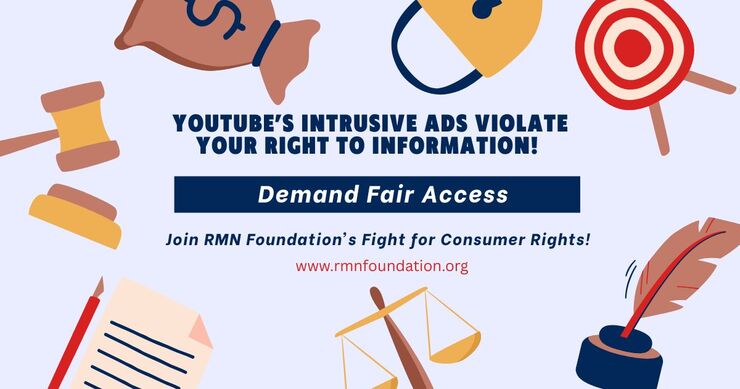
YouTube’s Intrusive Ads Spark Consumer Rights Concerns Over Information Access
The research highlights growing user frustration, with many viewers feeling bombarded by YouTube ads that disrupt their ability to engage with educational, cultural, or entertainment content.
By Rakesh Raman
New Delhi | August 4, 2025
The RMN Foundation, dedicated to protecting consumer rights, has raised alarms about YouTube’s excessive advertising practices, which are increasingly infringing on consumers’ rights to access information freely and without undue disruption.
A recent study by RMN Research reveals that YouTube’s intrusive ads—frequent, unskippable, and mid-roll placements—are creating significant barriers to seamless information consumption, violating fundamental consumer protections.
The research highlights growing user frustration, with many viewers feeling bombarded by ads that disrupt their ability to engage with educational, cultural, or entertainment content. This ad-heavy approach is seen as a violation of consumers’ right to access information, a principle enshrined in laws like the United Nations Guidelines for Consumer Protection (UNGCP), which emphasize fair treatment and access to essential services, including digital platforms. The UNGCP calls for businesses to avoid practices that harm consumers’ ability to make informed choices, and YouTube’s aggressive ad model arguably undermines this by prioritizing monetization over user experience.
In the United States, the Federal Trade Commission Act (Section 5) prohibits unfair or deceptive business practices. YouTube’s ad practices, which often interrupt content without clear user consent or adequate transparency about frequency, could be seen as unfair, particularly when users are coerced into disabling ad-blockers or paying for YouTube Premium to regain uninterrupted access. Similarly, the European Union’s General Data Protection Regulation (GDPR) protects consumers’ control over their digital experiences, requiring clear consent for data-driven ads. Yet, YouTube’s ad delivery often feels inescapable, raising questions about compliance with such regulations.
The RMN Foundation’s findings indicate that many users, particularly younger audiences, are turning to ad-blockers to reclaim their right to uninterrupted content consumption. However, YouTube’s countermeasures, such as restricting access for ad-blocker users, further alienate consumers, creating a coercive environment that undermines choice. The study also notes that the high cost of YouTube Premium places an unfair financial burden on users seeking an ad-free experience, disproportionately affecting low-income consumers.
“Consumers have a right to access information without being bombarded by intrusive ads,” said Rakesh Raman, founder of the RMN Foundation. “YouTube’s practices are not just annoying—they infringe on basic consumer protections under global and national laws.”
As competitors like TikTok offer lighter ad loads, YouTube risks losing users who feel their rights are being sidelined. The RMN Foundation urges YouTube to align its practices with consumer protection laws and adopt a more balanced approach to advertising. Without reform, the platform may face growing scrutiny from regulators and consumer advocates, potentially threatening its dominance in the digital space.
The RMN Foundation calls on consumers to report their experiences with intrusive ads and supports advocacy for stronger digital consumer rights. For more information or to share your story, you can contact RMN Foundation.
RELATED RMN NEWS REPORTS
[ Copytrack’s Global Intimidation Campaign: Victims Accuse German Firm of Extortion and Harassment ]
[ Clean House – Report Housing Corruption and Government Carelessness in Delhi ]
[ Bisleri’s Blatant Negligence Raises Alarms About Water Purity and Consumer Safety ]
[ JioMart’s False ‘Quick Delivery’ Claim Wastes Time and Money for Consumers ]
[ A Day Without Internet: Airtel’s 12-Hour Outage Exposes Gaps in Infrastructure ]
By Rakesh Raman, who is a national award-winning journalist and social activist. He is the founder of the humanitarian organization RMN Foundation which is working in diverse areas to help the disadvantaged and distressed people in the society.
